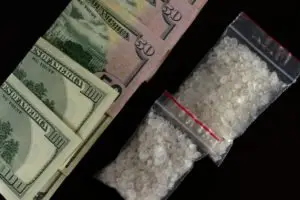
The offense of selling a substance in place of a controlled substance occurs if the accused agreed to sell a controlled substance but instead sold the buyer something else. This could be, for example, if someone agrees to sell someone cocaine but actually gives them a bag of flour or gives someone herbs when what was advertised for the sale was cannabis. These would both be considered an offense under Florida Statute 817.563. Depending on the drug that was agreed to be sold, this could be considered either a second-degree misdemeanor or a third-degree felony offense. Beyond the initial penalties, landing yourself a drug-related conviction could have far-reaching consequences on you, your family, and your future. Having a criminal record could make it difficult for you to access housing, find work, and could affect your right to vote or own a firearm.
Here at The Law Place, we understand how stressful it can be to be charged with this sort of crime. We also have many years of experience in defending individuals facing drug charges. If you or a loved one are facing drug charges, the best thing you can do is to contact an experienced criminal defense lawyer. We put the attorney-client relationship at the forefront and give support and advice to our clients throughout the entire legal process.
One of our experienced attorneys may be able to reduce your sentence and will fight hard to get you the best possible outcome. Contact us today for a free case consultation, where we can help advise you on the best next steps to take.
Our phone lines are open 24hrs a day, 7 days a week. So call us today at (941) 444-4444.
Florida Controlled Substances Laws
Under Florida Statute 817.563, it is illegal to offer to sell a controlled substance, regardless of whether the substance in question is, in fact, a controlled substance. If it is proved that you agreed to sell someone a controlled substance such as marijuana and instead gave (or intended to give) the buyer a legal substance, then you can still be convicted.
The severity of your conviction will depend on the drug that was agreed to be sold and its classification. You could be facing anything between a second-degree misdemeanor and a third-degree felony offense, depending on the schedule of the drug.
Controlled Substance Schedules
Controlled substances are categorized into five schedules according to their potential for addiction and to cause harm to the public. The penalty for committing the crime of selling a substance in place of a controlled substance will depend on the schedule that the drug falls into. A comprehensive list of substances and their categorization can be found in Florida Statute 893.03. The five schedules are the following:
- Schedule I – Substances that have a high potential for abuse and pose the greatest risk to the public for addiction and harm. They are considered to have no medicinal benefit. They include LSD, meth, and heroin.
- Schedule II – Includes substances such as cocaine, methamphetamine, morphine, and Oxycontin. They are considered to have some medical benefits but carry the second-highest risk of addiction and harm to the public.
- Schedule III – Substances in this category have a moderate risk of harm and addition to the public and include ketamine, codeine, and steroids.
- Schedule IV – These substances are considered to have a low risk of harm and addiction to the public, such as Xanax, Ativan, Tramadol, Ambien, and Valium.
- Schedule V – These substances are considered to have the lowest risk of potential dependence, harm, or abuse and include drugs such as Lomotil and Lyrica. They also carry the lowest associated penalties.
Depending on the schedule the drug you agreed to sell falls into, your penalty for the sale of a substance in place of a controlled substance will vary.
For example:
- If the substance you offered to sell is listed under Schedule I-IV, you could be charged with a third-degree felony. A felony of this level will result in a fine of up to $5,000, 5 years of probation, and up to 5 years in prison.
- If the substance is listed as a Schedule V drug, you could be charged with a second-degree misdemeanor. The common penalties for a misdemeanor of this type are a fine of up to $500, a minimum jail sentence of 60 days, and home detention for a further 6 months.
Other factors can also affect the severity of your penalties. For example, the penalties will be worse if:
- You have prior drug convictions.
- You used a firearm when engaging in the sale.
- You sold (or intended to sell) to a minor.
- The sale occurred within 1,000 feet of a school, church, park, retirement home, or public housing.
Common Misconceptions
The sale of a substance in place of a controlled substance should not be confused with selling a substance in place of a controlled substance. In the latter case, the substance is itself illegal, whereas, in the former, the substance is only imitating a controlled substance but is not in itself illegal.
If you are charged with the sale of a controlled substance (rather than a substance in place of the controlled substance), the penalties will be higher. The severity of the penalties given will again depend on the drug being sold but could include a prison sentence between 5 and 15 years. You can find out the maximum possible sentences for a specific controlled substance by looking at Florida Statute 893.03, which details the different drug schedules and their associated penalties.
The sale of a substance in place of a controlled substance should also not be confused with the crime of counterfeiting a controlled substance. As stated in Florida Statute 831.31, counterfeiting a controlled substance involves mixing or ‘cutting’ a drug with another substance. For example, a person might cut cocaine with baking soda to make the sale more cost-effective.
People often believe that a person will only be convicted if they are caught in the physical act of selling the substance. However, the statute is broadly defined so that simply possessing the substance with the intention to sell would be enough for a conviction if this intention can be proved beyond a reasonable doubt.
Neither does the sale have to be witnessed by an officer. The police will often rely on an undercover officer, confidential informer, or eyewitness to use later in your arrest. A single eyewitness could be enough to convict you as long as the jury believes the witness testimony beyond a reasonable doubt.
However, an experienced criminal defense lawyer will know the ways to help make a jury see that there is reasonable doubt. This could focus on a lack of concrete evidence, such as video footage or fingerprints, or witness credibility. For example, many confidential informants lack credibility because of previous criminal records, an incentive to receive a reduction in their impending criminal charges, or payment for their cooperation with the police.
Will I Be Convicted?
As with most cases involving the sale of a controlled substance, a lack of evidence can be the key to your defense. For you to be convicted, a state prosecutor will have to prove beyond any reasonable doubt that you offered to sell the controlled substance. It would not be enough if you were simply contemplating the sale.
In order to convict you, the prosecutor must be able to prove that:
- You offered, agreed, or consented to the sale of a controlled substance without the legal authority to do so.
- You committed to the sale of the substance in place of a controlled substance, where money or something of value was exchanged for the purchase of the substance either by hand or transferred electronically.
A criminal defense attorney will fight your case in different ways according to the circumstances of your case. But some methods that your defense attorney could use to challenge the prosecution could be to question:
- Whether it can be proven that you offered to sell a controlled substance.
- Whether it can be proven that the substance sold was exchanged for money or an object of value.
- Whether they can prove that you were aware that the controlled substance involved was an illegal drug.
- Whether they can prove that you were the actual seller of the controlled substance in question
- Whether the witness account used against you has any conflicting details or is unreliable in some way
By asking questions such as these, your defense attorney can cast doubt on the prosecutor’s assertions of your guilt. This could lead to a reduction of the charges against you or even a dismissal of the case.
Other Possible Defenses for Sale of a Substance in Place of a Controlled Substance Charge
The charges filed against a person for a controlled substance charge will depend on the specifics of the case, such as the type and amount of drugs present. Whether you are facing charges for possession, sale, or intention to sell, a criminal defense attorney who is familiar with drug cases will be able to build a defense to dispute one or more aspects of your drug sale case. Some common defenses available to you include:
- Challenge constructive possession – In the case that the prosecution cannot prove ‘actual’ possession with drugs found on your person, they could attempt to charge you with constructive possession. A defense attorney could help to prove that the defendant did not have knowledge of the presence of the drugs or access to them.
- Personal use defense – If the prosecution is unable to provide evidence of sale or intention to sell with, for example, a large quantity of drugs or money, distribution equipment, or individually-bundled units, the defendant could claim that the drugs were intended for personal use. This carries smaller penalties, although it is admission to possession of a controlled substance.
- Entrapment defense – If the defendant was illegally encouraged by police or a confidential informant to commit a crime when the person would not otherwise have been inclined to engage in this activity, this could be a valid defense in court.
Your defense attorney will build a defense according to the specifics of your case. This could include determining whether the search and seizure were lawful and making sure that your constitutional rights are being protected. If the police officer or officers that handled your case did not have probable cause or failed to follow the strict legal protocols when they made the stop and search, then their evidence will not be valid. Small missteps made by the police at the time of the arrest or in gathering evidence could cause the court to exclude this evidence, which could result in the reduction or even the dismissal of your charges.
If you have been arrested for, or are under investigation for the sale of a substance in place of a controlled substance in Venice, Florida, contact us today for free legal advice on your case.
Could I Be Charged With Possession With Intent to Sell?
If there is no concrete evidence of a sale, the prosecution could try to charge you with possession with intent to sell under Florida Statute 893.13. The prosecution could use evidence such as the presence of large amounts of cash or drug paraphernalia such as baggies or scales.
If you are charged with possession of a controlled substance with intent to sell, this could mean a first-degree misdemeanor, second-degree felony, or third-degree felony, depending on the substance involved.
If you work with us, one of our defense lawyers will work tirelessly to build an aggressive defense strategy on your behalf, collecting evidence to help prove that you did not have plans to sell a controlled substance. Contact our team for a free consultation today to discuss the details of your case with a criminal defense attorney.
Call The Law Place Today
Here at The Law Place, we understand how stressful life can be when you are facing charges for a drug crime in the State of Florida. Being charged with possession of, sale of, or intent to sell a controlled substance could have a huge impact on your life. Drug charges are extremely severe in Florida, which is why you need the help of an attorney who knows the ins and outs of Florida’s drug laws and defense strategies.
The best thing you can do is to contact a criminal defense lawyer as soon as possible. Our firm has over 75 years of combined experience and has helped countless people facing drug crime charges to improve the outcome of their case. We put our attorney-client relationship at the forefront so that you know you can trust us to be by your side throughout the legal process. Most of our attorneys have an AVVO rating of 10.0, the highest possible rating, and our firm has received numerous positive reviews from previous clients.
Contact us for a free case evaluation today. We keep our phone lines open 24hrs a day, 7 days a week. So don’t hesitate. Take the first steps to help take back control of your life. Call us for free, no-obligation legal advice that could make all the difference to your future.
Call now on (941) 444-4444 to see how we can help.



